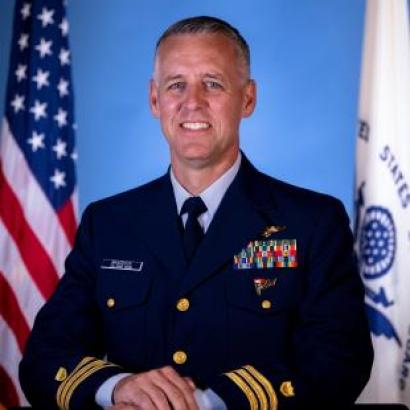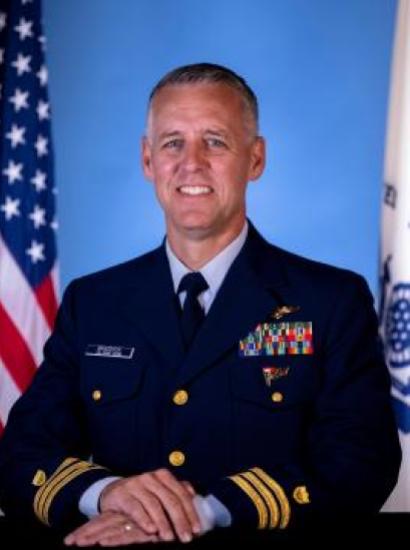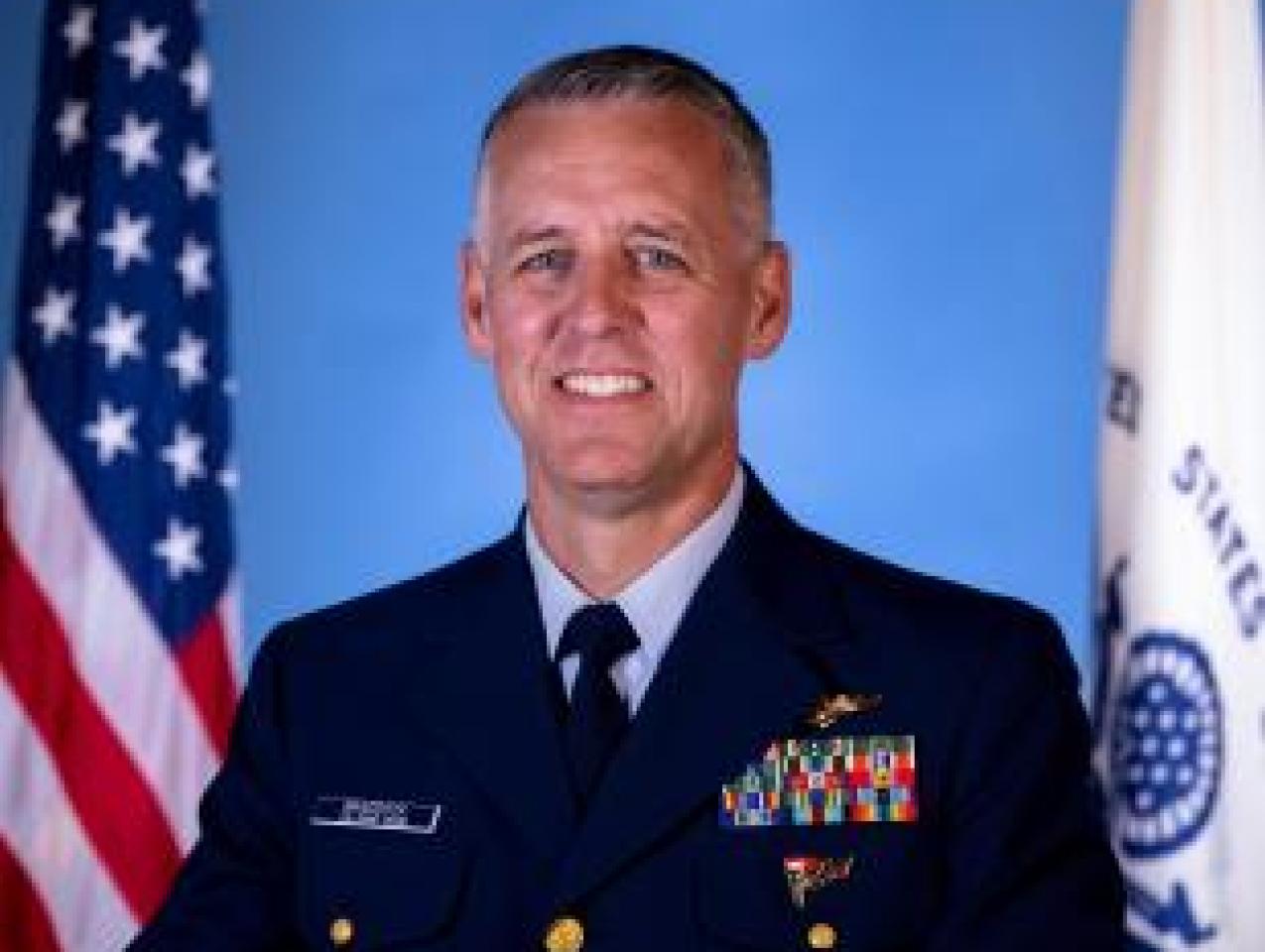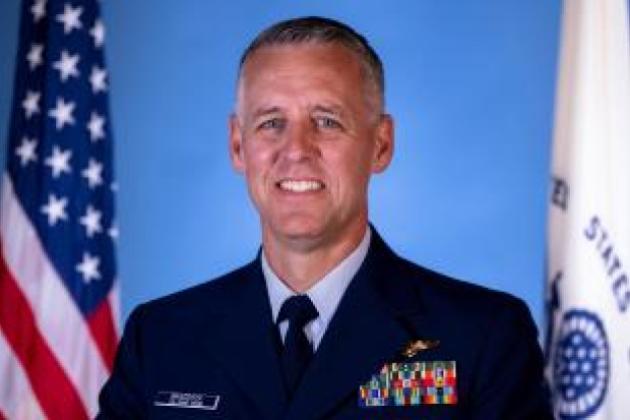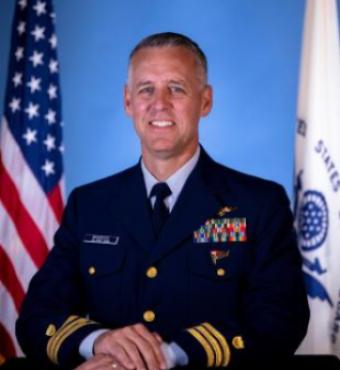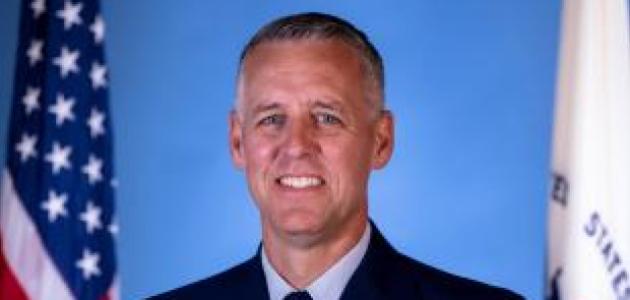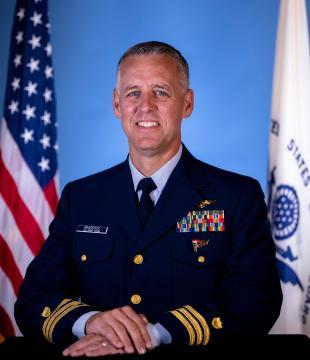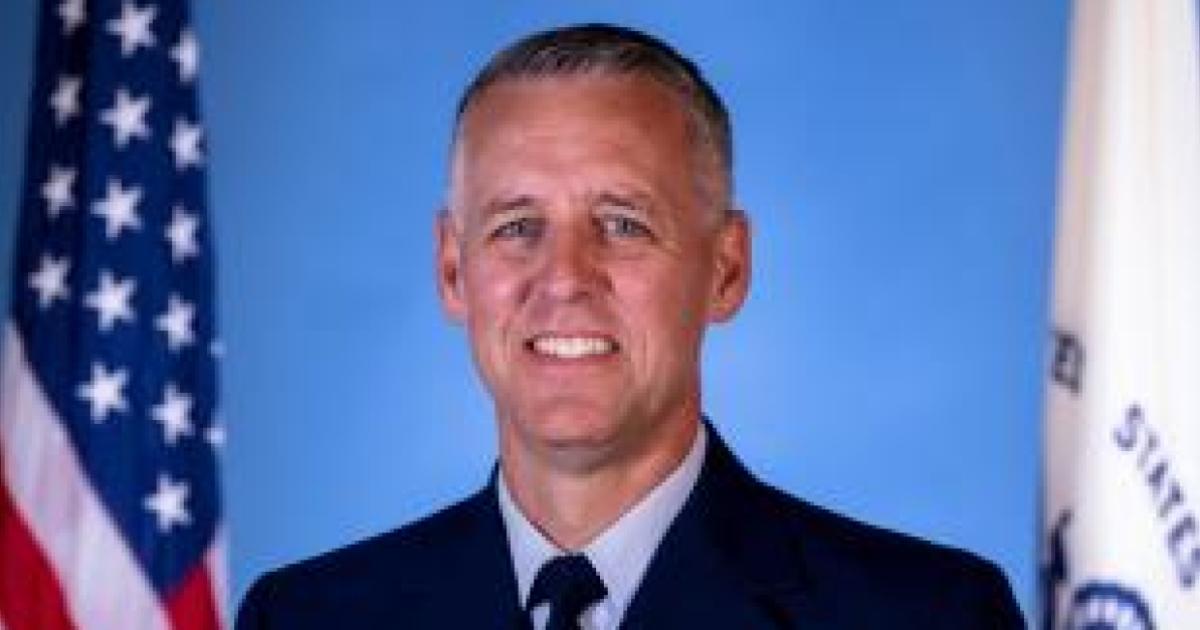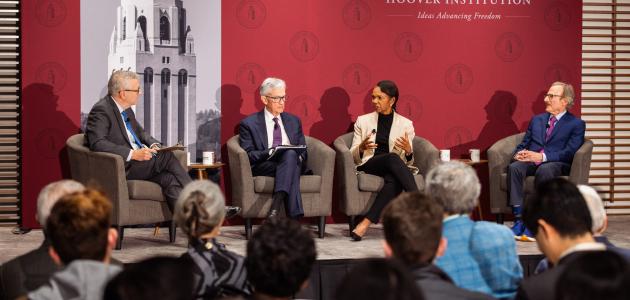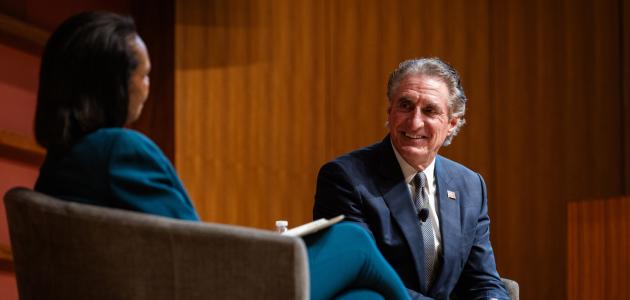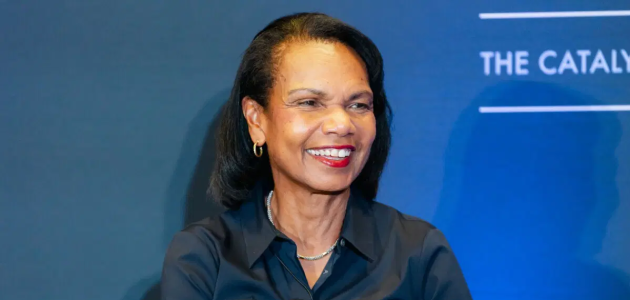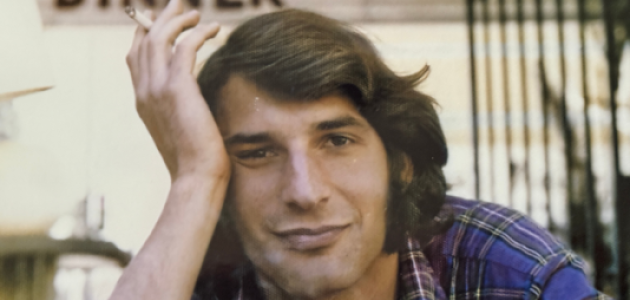Commander Corey Braddock represents the US Coast Guard as a Hoover Institution National Security Affairs Fellow for the academic year 2022–23.
In this interview, CDR Braddock discusses his twenty-six-year military career that has spanned the US Army and Coast Guard. In that time, he has led large and small units, accumulated over four thousand hours piloting four different types of military aircraft, and served as a staff officer across a myriad of organizational constructs. Moreover, he describes the Coast Guard’s statutory missions and those he personally executed on a regular basis, including search and rescue, coastal security, law enforcement, and drug interdiction.
CDR Braddock was recently selected as a captain (O-6) and will soon be responsible for standing up the Coast Guard’s Expeditionary Logistics Group.
Regarding research that he plans to conduct during his fellowship year at Hoover, CDR Braddock is studying the Department of Homeland Security’s role, vis-à-vis the Coast Guard, in global gray-zone competition—execution of national power above routine statecraft but below a conventional military conflict. It is his hypothesis that a consistent maritime law enforcement presence, specifically in the Indo-Pacific, the Western Hemisphere, and the Arctic, forms the foundation for enduring economic and security partnerships.
Why did you decide to join the US Coast Guard?
Corey Braddock: I grew up in South Dakota and was always proud of my father and brother for their service in the US Marine Corps. While neither made the military into a career, I admired their public service and great stories of adventure. For me, collegiate sports connected me to the military. When I was in high school, the US Military Academy and the US Naval Academy recruited me to swim on their Division I programs. Honored by their interest, and after wonderful recruiting trips to both institutions, it was clear that attending a service academy held great potential. Thus, I accepted an appointment to West Point and began my military journey. And what an experience it was! West Point’s academics were top-notch, the military education developed me into a leader of character, and collegiate swimming truly enriched my life. Best of all, I now routinely shout, “Go Army, Beat Navy!”
How did I end up in the Coast Guard? Upon commission from West Point, I reported to Fort Rucker, Alabama, and entered Army flight school. There, I found the passion that would steer all future pursuits—piloting military aircraft. After eighteen months of flight school, and as a newly winged aviator, I embarked on eight years of Army service flying the UH-60 Blackhawk and leading soldiers. Without question, assignments in the 101st Airborne Division, the Second Infantry Division, and the 337th Infantry Regiment shaped my career. Moreover, leadership roles as a platoon leader, brigade operations planner, and company commander matched the stories of adventure I had heard from my father and brother. However, in my final Army assignment, I decided it was time to integrate a growing family into my career calculus. Thus, in 2003, I applied for acceptance into the Coast Guard and, in 2004, changed uniforms.
Why the Coast Guard?
Corey Braddock: Two things have always driven my military service: a passion for piloting aircraft and a desire to lead. The Army gave me many wonderful opportunities to do both; I will never forget jumping out of airplanes, rappelling from helicopters, flying the Blackhawk, and leading amazing soldiers. Thankfully—and unfortunately at the same time—I trained a lot in the Army for aviation combat situations; however, I did not put that into practice in combat. Life is all about timing, and in my case, my Army experience was more about training than deploying. In comparison, I observed that a Coast Guard career could place me in an operational environment each and every day. Each time I took off in a Coast Guard helicopter, or led other Coasties in an urgent mission, it has been in direct operational service to the American public. Moreover, the Coast Guard’s structure of piloting aircraft solely with commissioned officers ensured I would stay intimately involved in flight operations throughout my entire career. While the transfer came with some personal costs, the benefits have been immeasurable.
Will you talk about your career in the US Coast Guard?
Corey Braddock: The Coast Guard has eleven statutory missions under federal law, and I have had the pleasure of executing most of those along both coasts, in the Gulf of Mexico, over the Great Lakes, and while deployed in the Atlantic and Pacific Oceans. Flying assignments at air stations in Savannah, Georgia; Detroit, Michigan; and San Francisco, California, helped broaden my skill sets through mastery of overwater flight, extensive flight in instrument meteorological conditions, and shipboard-helicopter operations. Moreover, an assignment to the Coast Guard’s Helicopter Interdiction Tactical Squadron (HITRON) in Jacksonville, Florida, gave me a firsthand look at the service’s drug interdiction mission. Along the way, I had opportunities as a helicopter instructor pilot, flight examiner, maintenance pilot, and aeronautical engineer. In addition to my operational assignments, I served at Coast Guard headquarters overseeing the Service’s personnel and human resources budget portfolio. My oversight covered 60 percent of the Service’s $12 billion budget and included $4 billion for military, civilian, and retiree pay and benefits. This year at the Hoover Institution truly complements my previous experiences and will undoubtedly help me in future assignments.
Tell us more about the Coast Guard’s mission of drug interdiction.
Corey Braddock: The Coast Guard’s mission of drug interdiction is codified in law and further synthesized in the president’s National Drug Control Strategy and the Maritime Law Enforcement Act. For the Coast Guard, it is an interesting problem set. Transnational criminal organizations leverage the profits from illicit trade to finance many of their operations. Unfortunately, US consumers provide a consistent market for these substances and criminal organizations willingly meet the demand. While various avenues for this illicit trade exist, a popular route is via the maritime domain (departing from South America and landing in northern Central America). Locating these vessels, interdicting them, and prosecuting the offenders requires a well-coordinated, multilayered government approach. In 2001, after having spent decades combatting this illicit trade primarily from surface assets, the Coast Guard stood up an airborne use-of-force unit, HITRON, to enhance its interdiction capabilities. With this capability, criminal organizations could not simply outrun law enforcement presence on the high seas.
The Coast Guard is different from our Department of Defense counterparts in that we operate under Title 10 authorities of the US Code (armed forces) and Title 14 authorities (law enforcement). Given such dual authority, we are perfectly postured as the lead federal maritime law enforcement agency to tackle drug interdiction.
Specifically, as it relates to my career, US Coast Guard cutters often deploy with a HITRON aircraft that is capable of airborne use of force—a capability to stop noncompliant vessels by disabling their propulsion systems. I had the honor of serving this unit from 2009 to 2012 and can attest that such flight operations—far offshore, low over the water, at high speeds, and generally at night—push our aircraft and aircrews to their limits. That said, the Coast Guard’s success rate is impressive. I am proud to have trained other aviators in this mission and to observe its continued success today. Ultimately, the service’s layered implementation of cutters, boats, aircraft, and intelligence continues to disrupt these transnational criminal organizations.
Does the US Coast Guard conduct operations with international partners?
Corey Braddock: Absolutely. Our many bilateral agreements help the service execute its myriad of missions around the world. The UN Convention of the Law on the Seas (UNCLOS) defines the boundaries of international waters, economic exclusive zones, and territorial seas. Partnerships with other nations allow the United States to access these areas as we try to protect a nation’s resources or stop criminals that try to hide in them. Such bilateral relationships make us extremely effective.
As with combating drug smuggling, establishing the nationality of a vessel on international waters is paramount. When a vessel is stateless and in international waters (e.g., not claiming ownership to any one state), we can leverage the Maritime Law Enforcement Act to respond to suspected drug smuggling. If that same vessel is also in the territorial seas of another nation, our bilateral agreements can help us gain access in order to disrupt the criminal activity. Moreover, when a suspected vessel claims a nationality, we also leverage such bilateral agreements and work with the respective nation to deter criminal behavior. These bilateral agreements are a key facet to global gray-zone competition.
Additionally, we regularly conduct maritime operations and exercises with the navies and coast guards of other nations. We also implement various “shiprider” programs that place law enforcement officers of other nations on Coast Guard vessels to enhance maritime operations and security.
Will you talk about your graduate studies and how they contributed to your career development?
Corey Braddock: The Coast Guard truly cares about the personal and professional development of its members. As such, I have had wonderful opportunities to grow. As I transferred into the service, I had a strong desire to attain a master’s of business degree. Since I was also an operational pilot in Savannah, Georgia, I achieved that goal through an online educational program from the American Public University. The program may not carry the prestige of a traditional MBA, but it was academically rigorous, good for me professionally, and valuable to the Coast Guard. Only a few years later, the Coast Guard gave me the opportunity to receive a master’s in public administration degree from the John F. Kennedy School of Government at Harvard University. That was a wonderful experience, which I spent focused on leadership decision making and federal budget policy.
After graduating with an MPA, I started working at Coast Guard Headquarters in budgeting and program advocacy. I had two responsibilities: planning and programming the Coast Guard’s annual budgets and congressional advocacy for its human resources (HR) programs. In both cases, my portfolio involved $6 billion in annual appropriations. I truly enjoyed every opportunity I had to discuss Coast Guard HR programs with the Office of Management and Budget, Congressional Members, and Executive staff. I am most proud of helping the Coast Guard implement the Blended Retirement System, one of the military’s most significant changes in its retirement system in decades. Unlike the Department of Defense, the Coast Guard was not a part of the Military Retirement Trust Fund, so I sought more efficient way to meet this financial requirement given the Coast Guard’s unique appropriations structure. It took multiple years; however, in 2018 Congress passed new legislation that ensured the Coast Guard’s long-term solvency as it relates to the new Blended Retirement System.
I also had the wonderful opportunity to attend the Executive Leader Program at the Center for Homeland Defense and Security (CHDS) in Monterey, California. Co-located with the Naval Postgraduate School, CHDS offers an exceptional curriculum focused on our homeland security leaders. This year-long program had a profound effect on me and created a network of homeland security professionals from which I regularly call upon.
What will be your research focus during your fellowship year at the Hoover Institution?
Corey Braddock: I hope to focus on global gray-zone activity from the perspective of the Department of Homeland Security and the US Coast Guard. Many citizens don’t know this, but the Coast Guard has assets deployed all over the world, including in the Indo-Pacific region, in the Arctic, off the coast of Africa, in the Caribbean, and in the Eastern Pacific. As we compete with our adversaries around the world, I believe a great deal of opportunity exists in the gray zone. That is in building lasting and enduring relationships with nations in between positions of military strength and routine statecraft—essentially, becoming trusted partners in the global maritime commons. This requires a regular and consistent presence for effectiveness.
Specifically, I think the Coast Guard plays a pivotal role giving other nations economic choice instead of ever-growing economic coercion. I’ll use the Indo-Pacific as an example. Fish stocks and legal fishing are critical to many Indo-Pacific nations. The People’s Republic of China regularly challenges UNCLOS-established economic zones and fiercely protects its distant-water fishing fleets as they steal other nations’ resources. The Coast Guard is uniquely situated, given its dual authorities, to assist these nations in terms of regulation, reporting, and security. Given that the Coast Guard is smaller than its DoD counterparts and we find our assets farther and farther from the homeland, I hope to raise public and congressional advocacy for investment in this critical activity.
What does leadership mean to you?
Corey Braddock: Leadership means a lot to me. I have been very fortunate and have worked for many great leaders during my career. I believe that the best leaders have strong character and empathy. By character, I mean steadfastness to integrity, selflessness, and humility. There is a lot in those three facets, but together they generate trust within organizations, create the conditions for others to succeed, and foster a positive climate. In terms of empathy, the best leaders actively seek to understand their subordinates and where they are coming from. Sometimes leaders must simply direct action and expect a commensurate response; however, most of the time truly understanding subordinates brings out their best performance.








